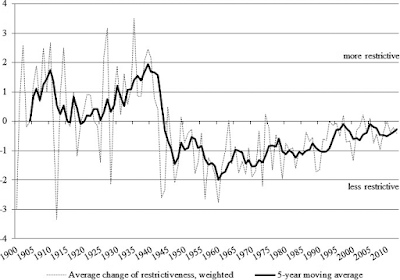A world of peace,
happiness and joy. Without any worries or diseases. That is one part
of the imagination which Michel Agier describes in her book “Managing
the Undesirables”. On the other side there are those who live
outside the walls of this perfect world. They simply grew up on the
wrong side of the barbwire fence. However they have no access to any
of the advantages the developed world could offer.
With the establishment of
the European Union and therefore the opening of the borders inside
Europe, the measures for border control are payed for not only by
countries like Greece or Italy who have external borders themselves,
but also by the EU. The merger of financial resources comes in hand
with a more global and hence more efficient border control. This is
reflected in agencies and programs like Frontex and Eurosur. The more
sophisticated this system of surveillance, border patrol and
deportation gets, the closer we get to actually living in Michel
Agiers perfect world.
 All of the above
points towards a more restrictive migration policy. But if we take a
closer look we will see that migration is not drastically limited as
a hole, but rather in some parts and encouraged in others. The DEMING
POLICY database unites data from 45 mostly European countries and
tracks over 6000 changes in migration policy since 1900. It shows
that migration policies did get less restrictive overall since world
war two. But still this is the average and can't be said for all
countries. Also the restrictions are far looser for low- and
high-skilled workers, as well as students and investors. The
selection of incoming migrants is a common and well known practice,
however globalization shifts the focus from a horizontal to a
vertical, from a racial to a social based selection.
All of the above
points towards a more restrictive migration policy. But if we take a
closer look we will see that migration is not drastically limited as
a hole, but rather in some parts and encouraged in others. The DEMING
POLICY database unites data from 45 mostly European countries and
tracks over 6000 changes in migration policy since 1900. It shows
that migration policies did get less restrictive overall since world
war two. But still this is the average and can't be said for all
countries. Also the restrictions are far looser for low- and
high-skilled workers, as well as students and investors. The
selection of incoming migrants is a common and well known practice,
however globalization shifts the focus from a horizontal to a
vertical, from a racial to a social based selection. We take Agiers
imaginary world one step further and use the 'Remnants' behind the
wall as a pool of supply that we can use for whatever we desire. In
this case workers who's education doesn't need to be payed for. The
public's fear of cultural diversity is used to justify the rejection
of some, while we accept others without the public outcry. This
paradoxical situation goes to show us that migration is actually
wanted by economy and politics. With only profit as a goal our
society sorts out the most profitable immigrants and takes them in,
but meanwhile uses the fear of them as a pretext to warrant measures
that violate human rights and keep the rest out.
We take Agiers
imaginary world one step further and use the 'Remnants' behind the
wall as a pool of supply that we can use for whatever we desire. In
this case workers who's education doesn't need to be payed for. The
public's fear of cultural diversity is used to justify the rejection
of some, while we accept others without the public outcry. This
paradoxical situation goes to show us that migration is actually
wanted by economy and politics. With only profit as a goal our
society sorts out the most profitable immigrants and takes them in,
but meanwhile uses the fear of them as a pretext to warrant measures
that violate human rights and keep the rest out.
References:
http://onlinelibrary.wiley.com/doi/10.1111/imre.12288/full#imre12288-fig-0001 25.11.2017
Michel Agier: “Managing the Undesirables” 2011
http://onlinelibrary.wiley.com/doi/10.1111/imre.12288/full#imre12288-fig-0001 25.11.2017
Michel Agier: “Managing the Undesirables” 2011


No comments:
Post a Comment